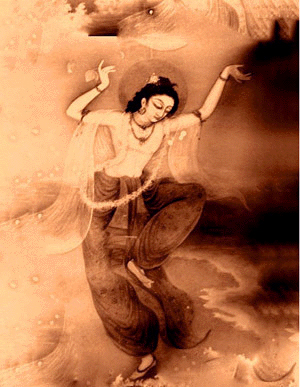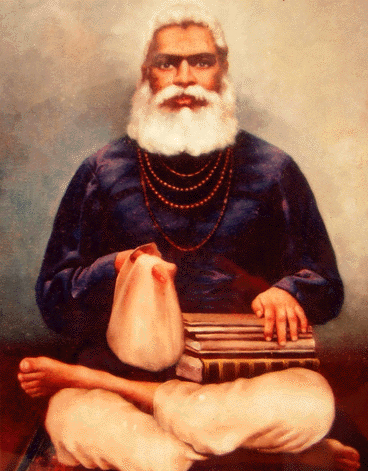Sri Sanmodana Bhasyam, Part 11
BY: SUN STAFF

Jun 02, 2016 — CANADA (SUN) — A commentary on Lord Caitanya’s ‘Siksastakam’ by HDG Srila Bhaktivinoda Thakur, with a Bengali song for each verse that expands upon Mahaprabhu’s devotional moods (Sanskrit, 1886).
na – not; dhanam – riches; na – not; janam – followers; na – not; sundarim – a very beautiful woman; kavitam – fruitive activities described in flowery language; va – or; jagat-isa – O Lord of the universe; kamaye – I desire; mama – My; janmani – in birth; janmani – after birth; isvare – unto the Supreme Personality of Godhead; bhavatat – let there be; bhaktih – devotional service; ahaituki – with no motives; tvayi – unto You.
“Lord of the universe, I do not desire material wealth, materialistic followers, a beautiful wife or fruitive activities described in flowery language. All I want, life after life, is unmotivated devotional service unto You.”
The sadhaka must attentively receive the sound of the holy name from the spiritual master; thereafter he may chant the name devoid of namaparadhas. By this process, the previously mentioned four qualities will gradually appear in his heart.
But if the sadhaka’s attachment to sensual pleasures is not severed, his original spiritual identity cannot manifest. Thus bhakti, the flavor of the hladini potency, cannot be transformed into the bhava of conjugal attraction.
This verse explains the pure form of sadhana-bhakti (here sadhana-bhakti means the process of chanting) in two ways. The direct explanation stresses the principal symptom of bhakti, which is loving devotional service to Sri Krsna (bhavabhakti); while the expressions ‘na dhanam na janam …’ point to the attendant symptom of pure bhakti.
The secondary symptom of bhakti has two concomitants – freedom from all other desires (anyabhilasita sunyam) outside the path of bhakti, and the absence of the influence of karma and jnana. As long as loving devotion to Krsna (anukulyam krsnaanusilam) is encumbered by anyabhilasitam, karma, jnana, yoga and so on, bhakti cannot be uttama (exalted); it is visible merely as shadow devotion or bhakti-abhasa.
This sloka in fact reveals how this shadow bhakti is to be dissipated. It is stated here, `O Lord! I do not hanker for dhanam (wealth), janam (following), or sundarim kavitam (beautiful poetry or literature).’ Here dhanam means the wealth of piety incurred by strictly following the path of varnasrama (which includes materialistic karma-kanda activities and so on). Further clarified, dhanam implies all the paraphernalia, gross and subtle, required to fulfill a person’s desires for sense enjoyment in this world and in heaven. The word janam indicates wife, sons, servants, subjects, friends, relatives, and so on.
Education or learning is correctly defined as the culture that promotes attraction to and attachment for the lotus feet of the Supreme Lord. The expression sundarim kavitam does not refer to narratives of Lord Krsna’s pastimes, or conclusive philosophical examinations of scripture, or transcendental literatures or poetry; rather, it refers to mundane literatures and compositions. Such trivia are rejected. And what is desired? The loving service of Krsna, even in birth after birth; let it be unwavering devotion devoid of any conditions.
Unconditional devotion means that which is guided by no consideration other than Krsna’s satisfaction.
In the jiva’s struggle to be victorious over all the many miseries suffered in the cycle of repeated birth and death, ultimate victory lies ever beyond his capacity – it depends entirely on the Supreme Lord’s will. All misery will automatically cease when, by the Lord’s desire, the jiva is saved from the cycle of birth and death. Therefore, what is the use of a Godless prayer for liberation that violates the precepts of pure devotion?
This prayer of Sri Caitanya Mahaprabhu expresses the soul’s urgent need of bhavabhakti over all else: “Without waiting for the cycle of birth and death to be stopped by the Lord’s grace, let me now have unconditional devotion at Krsna’s lotus feet life after life, regardless of what my present material situation is.”
Sri Caitanya Caritamrita Antya 20.27,28,30:
“As Lord Caitanya spoke in this way, His humility increased and He began praying to Krsna that He could discharge pure devotional service.
“Wherever there is a relationship of love of Godhead, its natural symptom is that the devotee does not think himself a devotee. Instead, he always thinks that he has not even a drop of love for Krsna.
“‘My dear Lord Krsna, I do not want material wealth from You, nor do I want followers, a beautiful wife or the results of fruitive activities. I only pray that by Your causeless mercy You give Me pure devotional service to You, life after life.'”
“O Lord of the universe! I have no desire for material wealth, following, or beautiful poetry. You are my object of worship and devotional service life after life; I only pray that I may have unconditional love and devotion at Your lotus feet.”
Sundarim kavitam refers to dharma, religious principles found in the Vedas; dhanam means artha, or wealth; janam means wife, children, relatives etc., who are the objects of kama (so-called love, or lust). The Lord declares, “I am not merely abhorred by sense gratification derived through religiosity, wealth and lust, but I am appalled at the idea of transitory liberation from the cycle of birth and death. I do not want these four Vedic goals (dharma, artha, kama, moksha) to be the cause for My rendering service at Your lotus feet.” A prayer by King Kulasekara has similarly expressed this mood of pure devotion.
Persons who strictly adhere to Vedic dharma worship Surya (the sungod); those who desire wealth worship Ganesa; those craving carnal pleasures worship sakti (Kali, Durga); those who strive for liberation or mukti worship Siva; and those who worship Lord Visnu as the source of Vedas do so for material motives. All these grades of worshippers are contaminated by materialism and are never to be considered as pure devotees. This type of Vedic worship is known as pancopasana or the worship of five demigods; whether it is performed with or without material desires hardly makes a difference, for such worship is in fact impersonal in any case. Lord Visnu can be worshipped purely and properly only by unmotivated devotional service.
Srimad Bhagavatam 6.11.25:
“O my Lord, source of all opportunities, I do not desire enjoy in Dhruvaloka, the heavenly planets or the planet where Lord Brahma resides, nor do I want to be supreme ruler of all the earthly planets or the powers of mystic yoga, nor do I want liberation if I have to give up Your lotus feet.”
Srimad Bhagavatam 11.2.42:
“Devotion, direct experience of the Supreme Lord, and detachment from other things – these three occur simultaneously for one who has taken shelter of the Supreme Personality of Godhead, in the same way as pleasure, nourishment and relief from hunger come simultaneously and increasingly, with each bite, for a person engaged in eating.”
Srimad Bhagavatam 1.5.18:
“Persons who are actually intelligent and philosophically inclined should endeavour only for that purposeful end which is not obtainable even by wandering from the topmost planet (Brahmaloka) down to the lowest planet (Patala). As far as happiness derived from sense enjoyment is concerned it can be obtained automatically in course of time, just as in course of time we obtain miseries even though we do not desire them.”
 #Caitanya
#Caitanya



Leave a Reply